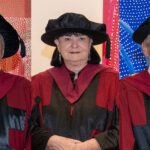Curtin University Associate Professor and infectious diseases expert Linda Selvey will travel to the Philippines this week, as one of only a handful of Australian medical professionals chosen by the World Health Organization (WHO) to assist with disease prevention efforts after Typhoon Haiyan.
Associate Professor Selvey will assist the Philippine Department of Health to monitor and prevent the spread of infectious diseases after last week’s typhoon, where more than 3000 people have been confirmed dead, more than 1500 people are still missing and more than half a million homes have been destroyed.
Associate Professor Selvey said she felt privileged to take up a four-week appointment in Manila, which came about through the WHO’s Global Outbreak Alert and Response Network (GOARN) – a WHO network of more than 300 technical institutions that have the capacity to support response to public health events of international concern.
Curtin University has been a member of the network since its inception in 2000.
“In a setting like this, with such a large number of displaced people brought together in camps and living in poor sanitation conditions, one of the biggest concerns is diarrhoeal disease,” Associate Professor Selvey said.
”Because of the crowded conditions, vaccine-preventable diseases like measles are also an issue because the vaccination rate isn’t high. Even common illnesses like bad colds and flus can really flourish in these settings.
“We will be looking for trends and any sudden changes that might represent an infectious disease outbreak, so that workers can move quickly on the ground to reduce the spread.
“I just hope that I can make a difference.”
Associate Professor Selvey has previously worked for the WHO in the eradication of polio in India and Nepal, particularly in the Indian state of Uttar Pradesh, which is home to more than 180 million people.
She also worked in the Philippines in 1996 monitoring rates of pneumonia ahead of a vaccination trial, held senior positions in Queensland Health for more than 12 years and was CEO of Greenpeace Australia Pacific from 2009 to 2011.
“As neighbours, we need to work together to prepare for and respond to such emergencies,” Associate Professor Selvey said.
“Unfortunately I think we are likely to see more severe natural disasters due to climate change. And Australia is a major contributor to climate change.”
Professor Bruce Maycock, Head of the School of Public Health at Curtin, said Associate Professor Selvey’s appointment reflected the highly practical nature of the expertise that existed in the School.
“As well as being a place of education and research, the School of Public Health is a repository of public health excellence that contributes to the international and national good,” Professor Maycock said.
“To have Linda chosen by the WHO, as one of only a handful of Australians to assist the Philippines government to fight infectious diseases, is a clear example of this.”
Associate Professor Selvey follows in the footsteps of the late Professor Aileen Plant, a leading epidemiologist from Curtin who was highly decorated for her work fighting the SARS virus in Vietnam.



